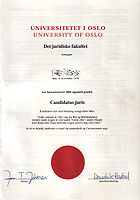
Candidate of Law
Encyclopedia

Denmark
Denmark is a Scandinavian country in Northern Europe. The countries of Denmark and Greenland, as well as the Faroe Islands, constitute the Kingdom of Denmark . It is the southernmost of the Nordic countries, southwest of Sweden and south of Norway, and bordered to the south by Germany. Denmark...
, Norway
Norway
Norway , officially the Kingdom of Norway, is a Nordic unitary constitutional monarchy whose territory comprises the western portion of the Scandinavian Peninsula, Jan Mayen, and the Arctic archipelago of Svalbard and Bouvet Island. Norway has a total area of and a population of about 4.9 million...
, Sweden
Sweden
Sweden , officially the Kingdom of Sweden , is a Nordic country on the Scandinavian Peninsula in Northern Europe. Sweden borders with Norway and Finland and is connected to Denmark by a bridge-tunnel across the Öresund....
, Finland
Finland
Finland , officially the Republic of Finland, is a Nordic country situated in the Fennoscandian region of Northern Europe. It is bordered by Sweden in the west, Norway in the north and Russia in the east, while Estonia lies to its south across the Gulf of Finland.Around 5.4 million people reside...
and Iceland
Iceland
Iceland , described as the Republic of Iceland, is a Nordic and European island country in the North Atlantic Ocean, on the Mid-Atlantic Ridge. Iceland also refers to the main island of the country, which contains almost all the population and almost all the land area. The country has a population...
after studying law for about 5–6 years.
The Swedish jur.kand is obtained after four and a half years at the normal pace. Danish and Icelandic degrees take five years, whereas the Finnish degree takes four years. In Norway, the degree is obtained after five and a half years, in addition to a compulsory single term entrance examination in philosophy and ethics, the Examen Philosophicum
Examen philosophicum
Examen philosophicum, often abbreviated ex. phil., is a course at certain Norwegian universities that functions as an introductory course within philosophy and scientific method...
- a total of 6 years. In Norway it was replaced by the degree Master of Laws
Master of Laws
The Master of Laws is an advanced academic degree, pursued by those holding a professional law degree, and is commonly abbreviated LL.M. from its Latin name, Legum Magister. The University of Oxford names its taught masters of laws B.C.L...
in 2003; the final student to graduate as a cand.jur did so in the spring term of 2007.
In Scandinavian countries, the exam can only be taken at a university with a diploma privilege
Diploma privilege
In the United States, the diploma privilege is a method for lawyers to be admitted to the bar without taking a bar examination. Once used by as many as 32 U.S. states and the District of Columbia, Wisconsin is currently the only state that offers a broad diploma privilege for admission to its state...
granted by the government - though any institution may provide legal education. University education was until recently based on large scale seminars rather than classroom education, thus several private institutions were established in the 1980s and 1990s in order to assist lawstudents.
Since 1837, at the then Royal University of King Frederik, Norwegian candidates have been required to swear an oath to avoid straying from truth and justice or encouraging needless dispute. The oath is no longer spoken, but it is implied with a handshake whilst receiving the diploma from the Dean (during the rather formal graduation-ceremony).
The degree is roughly equal to the Master of Laws
Master of Laws
The Master of Laws is an advanced academic degree, pursued by those holding a professional law degree, and is commonly abbreviated LL.M. from its Latin name, Legum Magister. The University of Oxford names its taught masters of laws B.C.L...
(LLM) in Europe
Europe
Europe is, by convention, one of the world's seven continents. Comprising the westernmost peninsula of Eurasia, Europe is generally 'divided' from Asia to its east by the watershed divides of the Ural and Caucasus Mountains, the Ural River, the Caspian and Black Seas, and the waterways connecting...
and the United States
United States
The United States of America is a federal constitutional republic comprising fifty states and a federal district...
.

